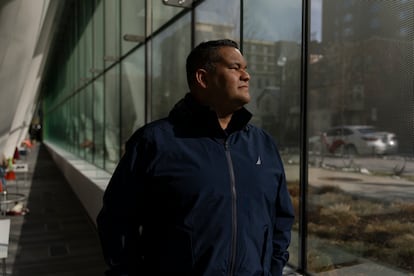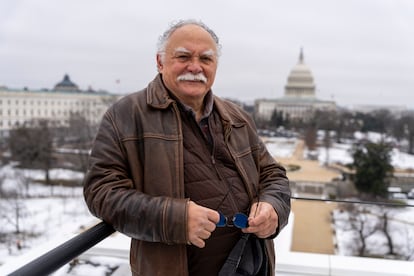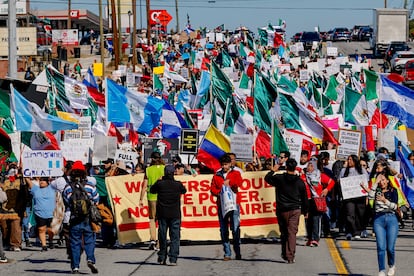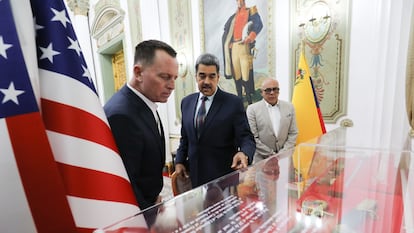Venezuelans who supported Trump now feel cheated: ‘They used us to win votes’
The Venezuelan community in the United States, which largely supported the Republican, is disappointed by the new administration’s policies against them, especially the withdrawal of protection for exiles


Sometimes Pedro Correa thinks that there is more to all this, some political game that in the end will present a great plan for Venezuelans. It is the only consolation he can offer himself. He cannot fathom that Donald Trump recognized that more than 90% of the Venezuelan community voted for him in the November elections, and that now his first decrees against immigration have been directed precisely against them. “The issue is not that he has attacked immigration in general, but specifically against Venezuelan immigration. If he was grateful for our vote, what is this double talk?” he asks.
Like Correa, many Venezuelans feel as if Trump has bitten the very hand that voted for him at the polls. The Republican promised during his campaign to maintain a policy of “maximum pressure” against Nicolás Maduro, but his new Secretary of Homeland Security, Kristi Noem, insists that Venezuela is now a safe country, to which all exiles must return (on deportation flights if necessary). “In Venezuela, the conditions for returning have not been met,” Correa says.

The 70-year-old Venezuelan cannot say that he is “regretful” of having voted for the Republican Party, a faction that, he says, aligns with his interests as a Christian and a conservative. But he no longer knows what to think. He arrived from Venezuela in 1994 and, once he had obtained American citizenship, his first vote was for Barack Obama, a guy who seemed “charismatic” to him; he liked the idea of the first African-American in power. But in the following two elections he distanced himself from the Democrats. “Because of the debauchery of the Joe Biden administration,” he says. And by “debauchery” he means issues of gender identity in education or the participation of trans people in sports, with which he does not agree.
A week had passed since Trump returned to the White House when the first rumors began to leak about the suspension of Temporary Protected Status (TPS), a legal umbrella under which some 600,000 Venezuelans live in the country, and which has provided safe permanence and work permits to more than a million citizens of countries such as El Salvador, Honduras, Nicaragua, Afghanistan, Sudan, Lebanon, Venezuela, and Haiti. A few days ago, the Department of Homeland Security (DHS) announced the official cancellation of the program, but only for the 300,000 Venezuelans who will benefit in 2023, a group that as of October will become part of the more than 13 million undocumented immigrants in the country.
During the election campaign, while people were debating the price of eggs, the cost of gasoline, salaries, and inflation, Venezuelans never thought that TPS was something to worry about, something that was at stake. “TPS was created precisely to protect Venezuelans who were fleeing tyranny until the situation in Venezuela improved and people could return. I have many friends protected by that program,” says Correa. He feels that the image of the Venezuelan immigrant “has been damaged” in recent times, it has been criminalized. “Venezuelans cannot all pay for one group. That is what worries me about this administration, which is putting us all in the same bag.”

“A wake-up call”
Luis Patiño, a 43-year-old Venezuelan who has voted twice in the United States — both times for Trump — also did not anticipate current events. “During his campaign, the president talked a lot about the Venezuelan situation and it can’t be that it has changed now,” he says. Patiño is surprised by everything Trump has done in the first month of his mandate, especially with the elimination of TPS. “There is not a single Venezuelan aware of what is happening in the country who agrees with the measure,” he says. “It was a wake-up call that the first measure was precisely against Venezuelans.”
Patiño has several friends and close family who will be affected by the suspension of TPS in October, when they will lose their work permit and the possibility of remaining legally in the United States. “It is violating our peace as a diaspora,” he says. And he feels that the different governments are playing with immigrants: “Every time there is an election, they say they are going to carry out immigration reform, and they end up doing nothing because it is all a political game.”
That’s why he says the only way to help Venezuelans is to “fix the underlying problem.” “If what they want is to return people to a normal Venezuela and solve the migration problem, the only way is to remove Maduro.”
Among the 1.3 million Venezuelans in the U.S., whose voters are increasingly Republican, Patiño is not the only one who places his hopes on the U.S. government to put an end to Chavismo. Many fervently believe that Trump is the only leader capable of shaking the foundations of the regime. In his previous term, the Republican threatened to land U.S. Marines in Caracas, but in January he sent a special envoy to negotiate the return of six American hostages. The Maduro government, which had broken relations with Washington in 2019, has shown itself willing to receive deportation flights.

“We fell back into the desire for someone to save us,” says Adelys Ferro, executive director of the liberal organization Venezuelan American Caucus, who closely studied Project 2025 and warned the community about how damaging the return of the Republican to power could be. “Even though we tried to get the message across, it wasn’t enough. The Venezuelan community supported and believed in President Trump.”
“We were used once again to win votes in Florida and to strengthen and consolidate Republican hegemony” in a state where nearly 400,000 Venezuelans live, says the activist based in El Doral, a neighborhood in Miami-Dade County where 40% of the population is of Venezuelan origin, and which has been baptized as “Doralzuela,” says Ferro.
After losing the 2016 election in El Doral, and winning it by a narrow margin in 2020, Trump took the largest percentage of votes last November. In a short time, the city has become a Republican stronghold and the presence of Venezuelan Trump voters who came to the United States in the last decade fleeing the systemic crisis in the oil-producing country has skyrocketed.
Guillermo Grenier, a sociologist at Florida International University, explains that more than 50% of Venezuelans in the United States are settled in Florida, the majority in Miami-Dade and Broward counties, and of these about 100,000 have the right to vote. “Between 65% and 70% of Venezuelan voters in the state supported Trump. Around 60% of Venezuelan voters are registered as Republicans, 35% as Democrats, and the rest as independents or unaffiliated,” he says. The sociologist assures that, although the power of the Venezuelan vote is “less evident” in contests for federal offices, it is decisive in local and state elections. It is an “important and growing” vote, he adds.
Grenier believes that the majority of Republican support is due, among other reasons such as economic stability or the desire to “integrate into American society,” to the fact that voters “are very susceptible to rhetoric around socialism, which has been a central theme in Republican campaigns.”
For Ferro, the reasons are clear, and almost the same as those of a community like the Cuban diaspora, settled in the south of Florida, where 68% voted for the Republican. “We Venezuelans have a kind of post-traumatic syndrome with the dictatorship, and that makes us dream that a messiah is going to come to save us from the misfortunes that people are experiencing in our country. That is what made many Venezuelans dream,” he says.
Now, disappointment is spreading at the same pace at which Trump’s policies are advancing. “There are many people who are silent because they are in shock, we are inundated with measures that affect us. People are falling for the idea that we were used,” Ferro sums up.
Sign up for our weekly newsletter to get more English-language news coverage from EL PAÍS USA Edition
Tu suscripción se está usando en otro dispositivo
¿Quieres añadir otro usuario a tu suscripción?
Si continúas leyendo en este dispositivo, no se podrá leer en el otro.
FlechaTu suscripción se está usando en otro dispositivo y solo puedes acceder a EL PAÍS desde un dispositivo a la vez.
Si quieres compartir tu cuenta, cambia tu suscripción a la modalidad Premium, así podrás añadir otro usuario. Cada uno accederá con su propia cuenta de email, lo que os permitirá personalizar vuestra experiencia en EL PAÍS.
¿Tienes una suscripción de empresa? Accede aquí para contratar más cuentas.
En el caso de no saber quién está usando tu cuenta, te recomendamos cambiar tu contraseña aquí.
Si decides continuar compartiendo tu cuenta, este mensaje se mostrará en tu dispositivo y en el de la otra persona que está usando tu cuenta de forma indefinida, afectando a tu experiencia de lectura. Puedes consultar aquí los términos y condiciones de la suscripción digital.








































